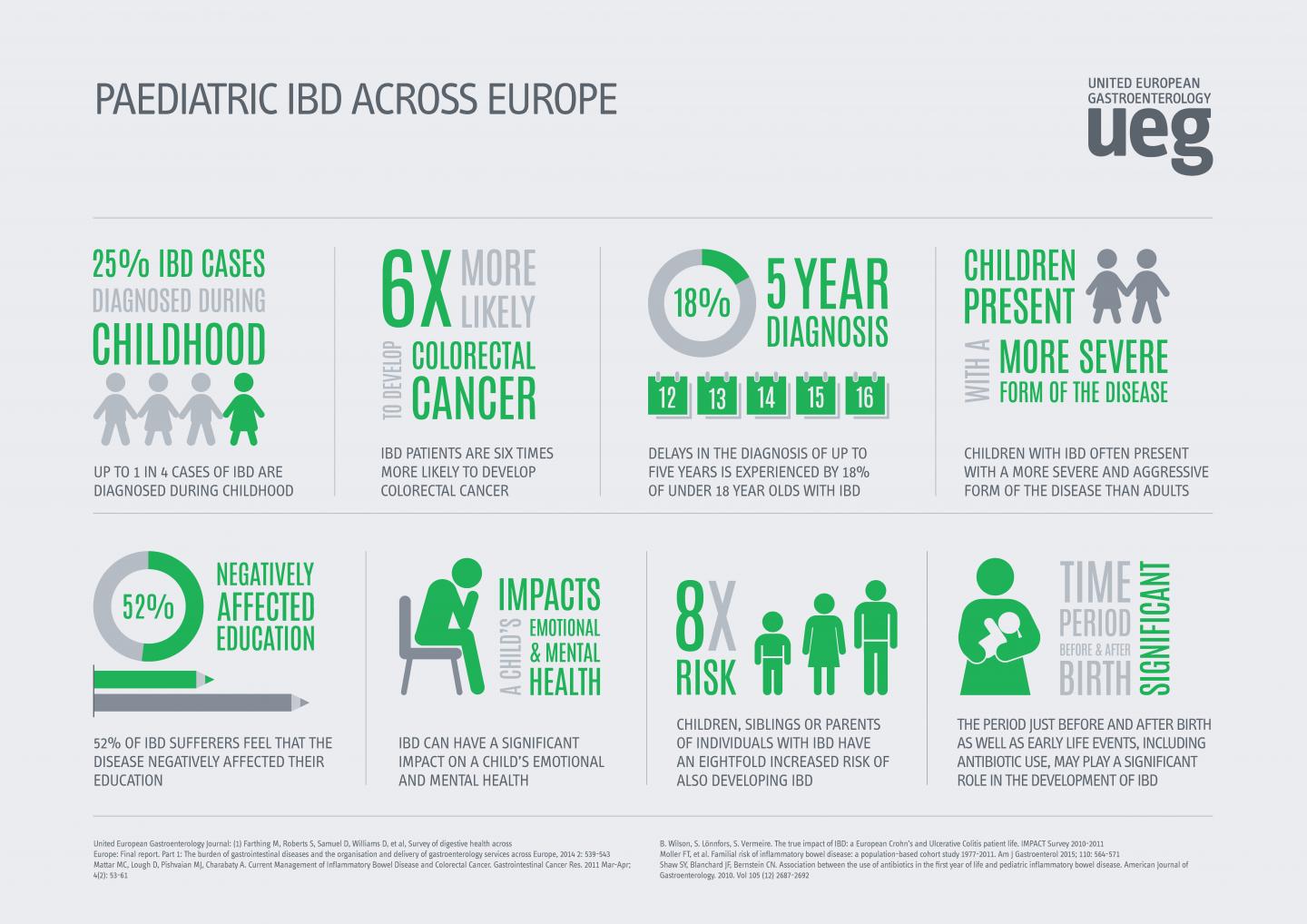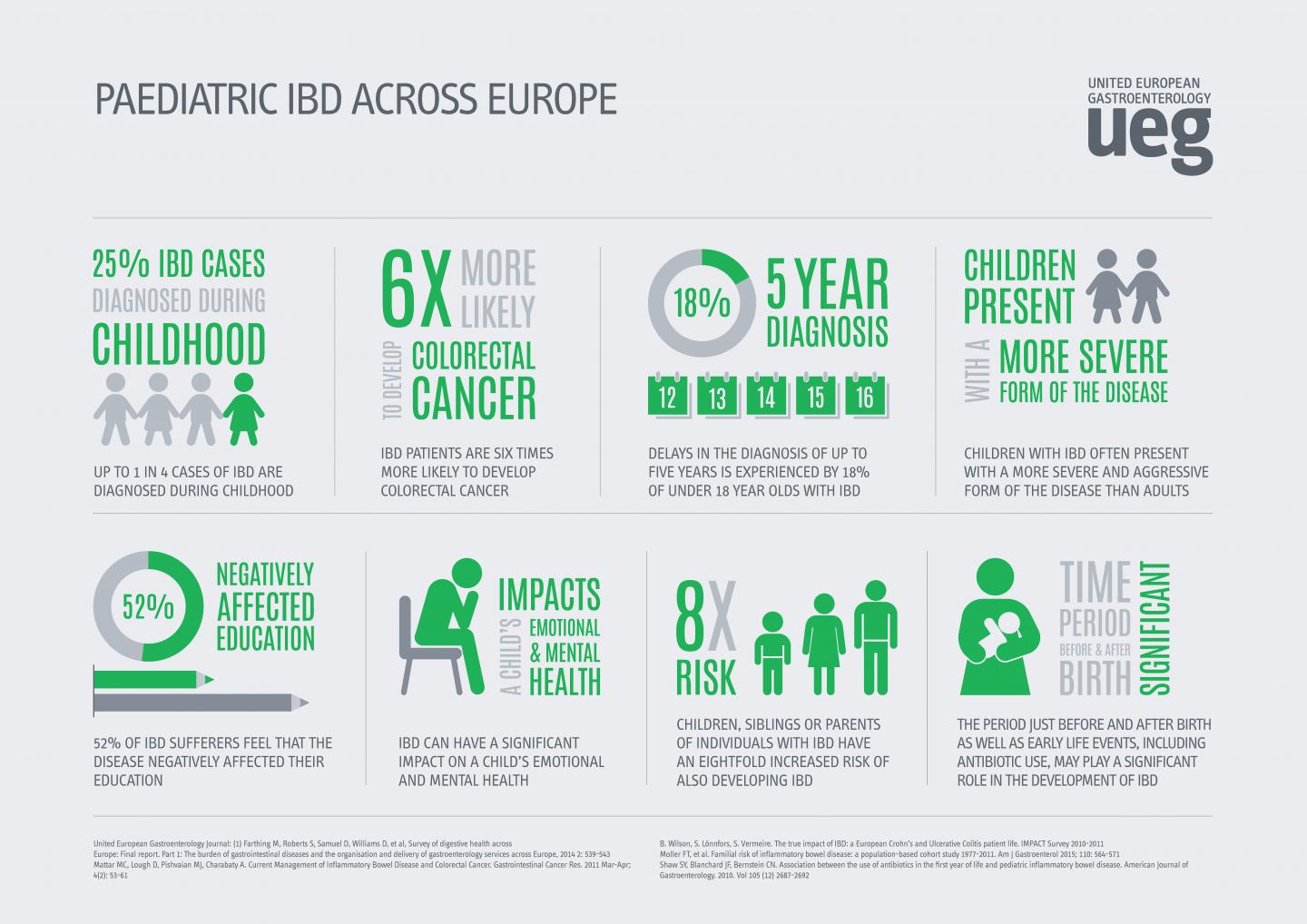
Credit: United European Gastroenterology
A new study highlights that children suffering from inflammatory bowel disease (IBD) are not meeting the daily recommended intake of calcium and vitamin D. The research, conducted at Great Ormond Street Hospital for Children in London, identified that only 26.6% and 21.3% of paediatric IBD patients were achieving the current recommended intake for calcium and vitamin D respectively.
Medical experts from United European Gastroenterology (UEG) are therefore calling for immediate intervention to ensure that paediatric IBD patients are not put at risk of experiencing poor bone health and development, calcium homeostasis imbalance and vitamin D deficiencies.
Achieving optimal levels of calcium and vitamin D is essential for developing children, especially in patients with IBD, as research suggests that children and adolescents with the disease develop suboptimal bone health in comparison to their peers. Therefore, they may not achieve optimal bone mineralisation, resulting in an increased risk of permanent height deficits. Vitamin D and calcium both play a major role in bone health and recently vitamin D has shown to potentiate the effect of anti-inflammatory treatments.
However, ensuring a sufficient intake of vitamin D and calcium in children can be challenging. Rita Shergill-Bonner, Principle Dietician at Great Ormond Street Hospital for Children, London, explains, "When taking into account their young age and modern eating habits, coupled with the emotional, psychological and physical stress of living with IBD, it can be hard for paediatric patients to maintain a balanced diet and a sufficient intake of the right nutrients. We therefore urge the parents and carers of paediatric IBD patients to monitor their children's diets carefully to ensure they are consuming the right foods to help their disease course and ensure adequate and normal development."
There is no solitary cause of IBD but it is thought to be due to a combination of genetic and environmental factors. Incidence rates have been steadily increasing over the past few decades and one in four cases of the disease are diagnosed during childhood. Physical IBD symptoms can be extremely debilitating, including severe abdominal pain, diarrhoea, weight loss and fatigue. The disease can also have a significant impact on a patient's psychological, emotional and mental health, with over half of sufferers feeling that the disease negatively affects their education. Professor Philippe van Hootegem, UEG IBD expert comments, "There are many effective drugs available to help treat IBD but there are still a lot of unmet needs in both child and adult patients. Interesting and hopeful new drugs, some of which are to be taken orally, are in their final development stage. Nevertheless, a definitive curative therapy is not on the horizon yet and future research is still needed."
"It is imperative that healthcare professionals provide all IBD patients with regular and frequent advice on nutrition and healthy eating habits, including guidance on food sources that are rich in calcium and vitamin D", adds Professor Gigi Veereman, UEG paediatric IBD expert. "Tailored care services, long-term follow up, regular reviews and frequent medical interventions are required to minimise additional health risk in our paediatric patients"
###
May 29th is World Digestive Health Day and this year health organisations from around the world are coming together to highlight the issues affecting patients living with IBD.
Notes to Editors
For further information and to schedule an interview with Professor Philippe van Hootegem, Professor Gigi Veereman or Rita Shergill-Bonner, please email [email protected] or phone Luke Paskins on +44 (0)1444 811099
About Professor Philippe van Hootegem
Professor Philippe van Hootegem is a member of the UEG Public Affairs Committee and a Consultant Gastroenterologist at the Sint-Lucas
General Hospital, Bruges, Belgium.
About Professor Gigi Veereman
Professor Gigi Veereman is a member of the UEG Public Affairs Committee and a Paediatric Gastroenterologist at the University Hospital, Brussels, Belgium.
About Rita Shergill-Bonner
Rita Shergill-Bonner is a Principle Gastroenterology Dietician at Great Ormond Street Hospital for Children, London, England.
About UEG
UEG, or United European Gastroenterology, is a professional non-profit organisation combining all the leading European societies concerned with digestive diseases. Together, its member societies represent over 22,000 specialists, working across medicine, surgery, paediatrics, gastrointestinal oncology and endoscopy. This makes UEG the most comprehensive organisation of its kind in the world, and a unique platform for collaboration and the exchange of knowledge. Find out more by visiting http://www.ueg.eu
To advance standards of gastroenterological care and knowledge across Europe and the world, UEG offers numerous activities and initiatives, including:
- UEG Week, the biggest congress of its kind in Europe, and one of the two largest in the world
- UEG Education, the universal source of knowledge in gastroenterology, providing online and classroom courses, a huge online library and delivering the latest GI news, fostering debate and discussion
- Training Support, funding for innovative training and educational programmes, as well as international scientific and professional co-operations
- UEG Journal, published bi-monthly, covering translational and clinical studies from all areas of gastroenterology
- EU Affairs, promoting research, prevention, early diagnosis and treatment of digestive diseases, and helping develop an effective health policy for Europe
References
1. Shergill-Bonner R., et al. Paediatric IBD patients do not meet the daily recommendations of vitamin D and calcium intake: survey based analysis in a tertiary centre. Presented at the 12th Congress of ECCO, Barcelona, February 15-18, 2017. Available here: https://www.ecco-ibd.eu/index.php/publications/congress-abstract-s/abstracts-2017/item/p707-paediatric-ibd-patients-do-not-meet-the-daily-recommendations-of-vitamin-d-and-calcium-intake-survey-based-analysis-in-a-tertiary-centre-2.html
2. B. Wilson, S. Lönnfors, S. Vermeire. The true impact of IBD: a European Crohn's and Ulcerative Colitis patient life. IMPACT Survey 2010-2011. Available here: http://www.efcca.org/sites/default/files/IMPACT-STUDIE_online.pd
Media Contact
Luke Paskins
[email protected]
44-014-448-11099
http://www.spinkhealth.com
############
Story Source: Materials provided by Scienmag





